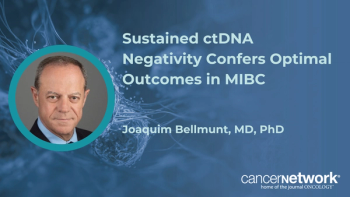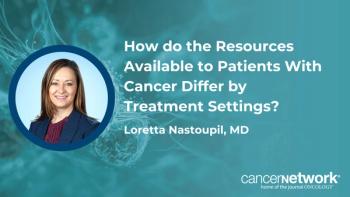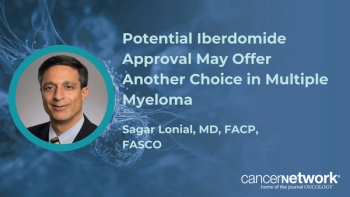
Oncology NEWS International
- Oncology NEWS International Vol 4 No 10
- Volume 4
- Issue 10
Dietary Phytochemicals May Play Major Role in Cancer Prevention
WASHINGTON-Phytochemicals are naturally occurring substances found in plants. They differ from vitamins and minerals in that they have no known nutritive value, but many have been found to have a protective effect against cancer, according to reports from the American Institute for Cancer Research (AICR) annual research conference.
WASHINGTON-Phytochemicals are naturally occurring substances foundin plants. They differ from vitamins and minerals in that theyhave no known nutritive value, but many have been found to havea protective effect against cancer, according to reports fromthe American Institute for Cancer Research (AICR) annual researchconference.
Although phytochemical research is in its infancy, scientistsat the AICR conference expressed excitement about their potentialability to inhibit cell conversion from normal to malignant ata variety of stages. Many speakers expressed a belief that a lifelongdiet rich in phyto-chemicals can have a significantly positiveeffect on cancer risk.
Tea as Chemopreventive
Hasan Mukhtar, PhD, said that the polyphenols found in green tea(and possibly those in black tea, although this has been lesswell studied) may have a chemo-protective effect against skin,lung, fore-stomach, esophagus, duodenum, pancreas, liver, andcolon cancer.
"Polyphenols appear to effectively protect mice against allthree stages of cancer: initiation, promotion, and progression,"said Dr. Mukhtar, professor and research director, Departmentsof Dermatology and Environmental Health Sciences, Case WesternReserve University.
In one series of studies, green tea, administered to mice eithertopically or orally, inhibited skin tumor growth and
development. In other studies, administration of green tea reducedthe tumor burden that occurs after exposure to ultraviolet-B radiation,which is the major risk factor for skin cancer in humans.
Polyphenols found in tea may inhibit binding of carcinogenic substancesto genetic material produced in cells as a re-sult of carcinogenicexposure. They may also protect against cancer by inhibiting metabolismof the carcinogenic material.
Dr. Mukhtar said that, to date, experimental studies in humanshave been inconclusive. However, in vitro studies on human prostatecancer cells indicate that green tea polyphenols may protect againstcancer development in that organ. He said that further studiescould define the population that might benefit from drinking greentea or by using tea in other edible substances.
Substances in Soybeans
Stephen Barnes, PhD, professor of pharmacology and toxicology,University of Alabama at Birmingham, said that the isoflavonesgenistein and daidzein have been linked to anticancer effectson mammary tumors in laboratory animals. He sees significant potentialfor these chemicals, which are found in soybeans.
Dr. Barnes is currently conducting pilot studies to gather datain advance of large clinical trials. In one study, healthy pre-and postmenopausal women are consuming diets with and withoutsoy to look for properties of breast fluid that may indicate alterationsin breast cancer risk. In another study, elderly men with elevatedprostate-specific antigen (PSA) are drinking soy beverages tosee if isofla-vones lower PSA levels.
Pamela Crowell, PhD, assistant professor of biology, Indiana University-PurdueUniversity at Indianapolis, told the conference audience thatperillyl alcohol and d-limonene (monoterpenes derived from cherries,lavender, and citrus peel) show chemopreventive activity againstmammary, lung, liver, and skin cancers in mice.
Perillyl alcohol also induced contact inhibition in cultured humanpancreatic carcinoma cells and inhibited their anchorage-independentgrowth. She said that these monoterpenes also appear to causetumor cells to shift to a less malignant type.
Eat Your 'Cruciferous' Vegetables
In his presentation, Stephen Hecht, PhD, said that natural andsynthetic isothiocyanates, occurring in conjugated forms calledglucosinolates and found in cruciferous vegetables, are effectiveinhibitors of tumors of the lung, esophagus, mammary gland, liver,bladder, and forestomach in rats.
"When the vegetables are chewed, the glucosinolates are hydrolyzedto isothiocyanates by the action of the enzyme myrosinase, andchemopreventive agents are released," said Dr. Hecht, directorof research, Naylor Dana Institute for Disease Prevention, AmericanHealth Foundation, Valhalla, NY.
Watercress and Smokers
Dr. Hecht is especially interested in the effects of watercressconsumption on levels of carcinogens in smokers. "Forty-fivemillion Americans are smokers and many are addicted to nicotine,"he said. "We need to look for compounds that might preventlung cancer in people who are not about to quit smoking."
Gary Stoner, PhD, said that tobacco smoking is a leading causeof esophageal cancer, which is rare but rapidly increasing inthe United States and endemic in China, Russia, Iran, Afghanistan,and Rhodesia. According to Dr. Stoner, Lucius Wing Professor ofPreventive Medicine and Pathology, Ohio State University, phenethylisothiocyanate was found to be a potent inhibitor of preneo-plasticand neoplastic lesions in the rat esophagus.
Lung cancer and esophageal cancer in rats induced by certain compoundsin cigarette smoke, such as the tobacco-
specific nitrosamine, 4-(methylnitros-amino)-1-(3-pyridyl)-1-butanone(NNK), can be inhibited by varying concentration of isothiocyanates,Dr. Stoner said. However, he added that these phyto-chemicalsare effective only if administered before or concurrently withexposure of the rats to carcinogens.
Phytochemicals Being Studied as Possible Cancer Preventives
Designer Foods as Chemopreventives?
If, as many researchers believe, a diet rich in fruits and vegetablesthat contain phytochemicals can help prevent cancer, should societyensure their adequate intake by allowing companies to fortifyfoods with phytochemicals? Should the compounds be synthesizedand sold in pill or powder form? Should we all have a phytochemicalcocktail before sitting down to dinner?
Probably not, at least in the foreseeable future, Mark Messina,PhD, said at the AICR conference (see story above).
Dr. Messina, a consultant for the North Central Soybean ResearchProject, said that "although phyto-chemicals may be the 'vitaminsand minerals' of the 21st century, we don't know enough aboutthe risk of overexposure to these compounds." He also expressedconcern about the safety of consuming phyto-chemicals that donot occur naturally in food.
Agreeing with Dr. Messina was Jerianne Heimendinger, ScD, programdirector, NCI Prevention and Control Extramural Research Branch."Until we have statistical proof of the chemoprotective effectsof phytochemicals in humans, we need to focus on specific dietaryrecommendations rather than phytochemical pills and potions,"she said.
Johanna Dwyer, DSc, RD, director of the Frances Stern NutritionCenter, New England Medical Center, cautioned that before phyto-chemicalscan be considered for use as cancer preventives, "we muststudy the cause and effect relationships of these chemicals tocancer cell development and metabolism, and develop surrogatemarkers for efficacy."
Articles in this issue
over 30 years ago
New Markers May Help Predict Course of Prostate Carcinomaover 30 years ago
Needle Exchange Programs Lower HIV Risk: Panelover 30 years ago
Computerized Database Could Lead to Improved Staging of Lung Cancerover 30 years ago
Centocor Wellness Program Includes Mobile Mammography Vanover 30 years ago
Institute of the Future Urges US to Increase Spending on Basic R&Dover 30 years ago
Yeast-Derived GM-CSF (Leukine) Cleared for Use in Older AML Patientsover 30 years ago
Spiral CT Offers Better Detection of Disease, More Accurate Stagingover 30 years ago
New Colon Ca Agent Is Available in FranceNewsletter
Stay up to date on recent advances in the multidisciplinary approach to cancer.



















































